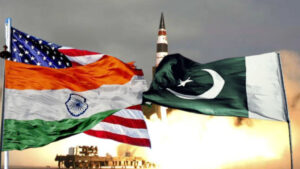From Conflict to Peace: Defense Day as a Day of Resilience and Peace-building

By Manahil Mukhtiar Raja
Kashmir being a disputed territory after the partition of the sub-continent, has been a flashpoint of tension and conflict. Kashmiris are scared and restless because of decades of wars, tussles, and military operations. The region has seen it all from the Indo-Pakistan war to the ongoing cross-border conflicts, which soon began in 1947 when Maharaja Harri Singh signed the Instrument of Accession with India against the wishes of his masses. Pakistan claimed Kashmir because of its Muslim majority, nonetheless, an illegal and dubious instrument of accession, and the subsequent invasion of India gave birth to the first Indo-Pak war. Since then, India’s aggressive policies and military posture have been an immediate threat to the regional peace and territorial integrity of Pakistan.
Since its occupation of Kashmir, India has been employing brutal force to deprive Kashmiris of their right to self-determination. Nonetheless, Pakistan on the other hand stood firm in its support of the people of Kashmir and never refrained from using either peaceful or military means. When India faced the mounting pressure of Kashmiri Mujahadeen and failed to fight back in Kashmir, it started a full-fledged war against Pakistan in September 1965. Pakistan’s armed forces successfully repulsed the Indian attack from three fronts and fought back with unmatched bravery and resilience. In recognition of its armed forces, every year Pakistan commemorates the “Defense Day” on 6th September. The nation abundantly pays homage and tribute to its brave sons including the legendary Major Aziz Bhatti, and the Pakistani military ability to stand against aggression.
September 6: a day not only to pay homage to the memories of martyrs but also to commemorate a path forward. Defense Day evolves into a beacon of reflection and peace-building for a truly secure nation. Peace is built when the military capabilities of a nation are strong and can effectively deter external aggression. Pakistan’s military capabilities were weaker than India’s before the 1965 war. After the Tashkent agreement in 1966 Pakistan’s defensive capabilities were not significantly maximized but it prevented the escalation of further conflicts and allowed Pakistan to maximize its existing military strength. India holds a dominant position in the defense sector with a large standing army. India’s advanced missile program, growing naval capabilities, and maximizing defense budget are pivotal points in defense. India’s large size, economy, and population give it a dominant position in the defense sector, and the US helps it maintain its position as India’s strategic partner.
Pakistan’s military capabilities have been maximized over the years despite the limited resources. Nuclear weapons, the development of ballistic missiles, and new fighter jets, and the upgrading of naval capabilities ensure the national security and sovereignty of Pakistan and deterrence against India’s conventional superiority. A balance of power is maintained by Pakistan with India because of the maximization of its defensive capabilities. This growing military power serves as a strategic deterrent, which makes it clear that Pakistan can defend itself from any external aggression. This ensures peace in the region.
Both Pakistan and India are countries having nuclear capability, and aggression from any side will have disastrous consequences and this reason is ultimately restraining the attack. Defense Day is a reflection of the importance of peacebuilding as a critical component of the national security and sovereignty of a state. Peacebuilding generally refers to addressing the root causes of conflicts and creating solutions that create long-lasting peace. The foreign policy of Pakistan is focused on creating an environment conducive to peace. It is primarily directed at the pursuit of national goals of seeking peace and stability through international cooperation. Pakistan played a role in the regional peace process when it facilitated peace talks between the Taliban and the US. Also, its participation in the UN peacekeeping mission is a shift that shows its commitment to global peace.
State survival and territorial integrity demand a strong military force. The world became multipolar which changed the dimensions. Strong military force is the bedrock of national sovereignty, stability, and influence. Pakistan’s military is keeping domestic peace as well as international peace in the region. The war on terror removes the extremist elements to ensure peace in the state. Still, there is space to turn over a new leaf. The 21st century demands more advanced armaments and technology. The defense sector holds the main position in providing prosperity and peace to a nation. The role of the military is the hindrance of external aggression and no threat to the borders for developing a peaceful nation. Pakistan army is a true force for stability. Defense Day should not only be considered a day just to pay tribute to the martyrs but also to recognize the military efforts and maximize the defense capabilities of Pakistan in building peace in the region.
The views expressed in this article belong to the author only, and do not necessarily reflect the views of The Global Politico.

Manahil Mukhtiar Raja
The Author is the Undergraduate Student of International Relations at the University of Azad Jammu and Kashmir.






